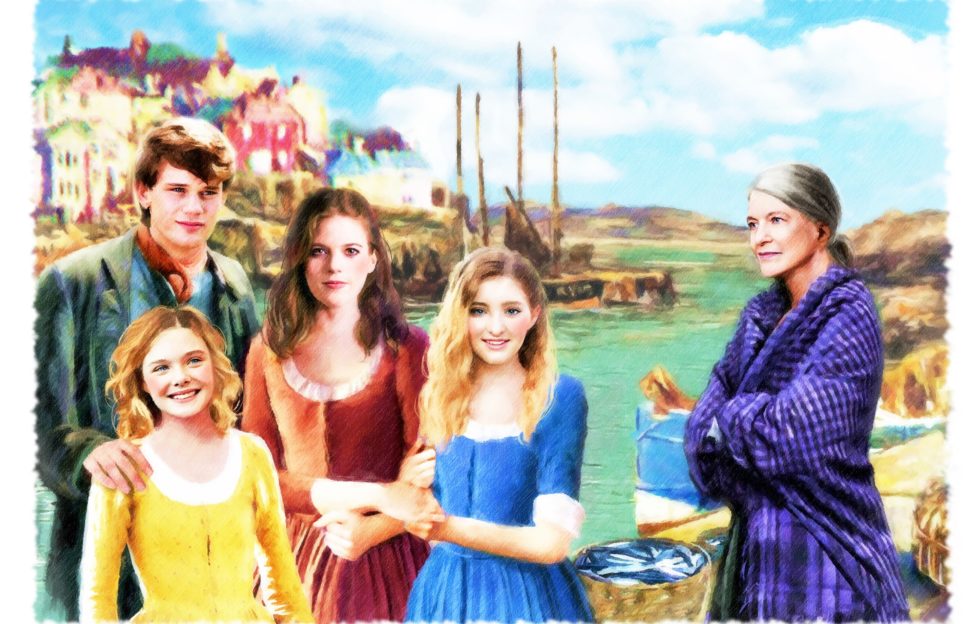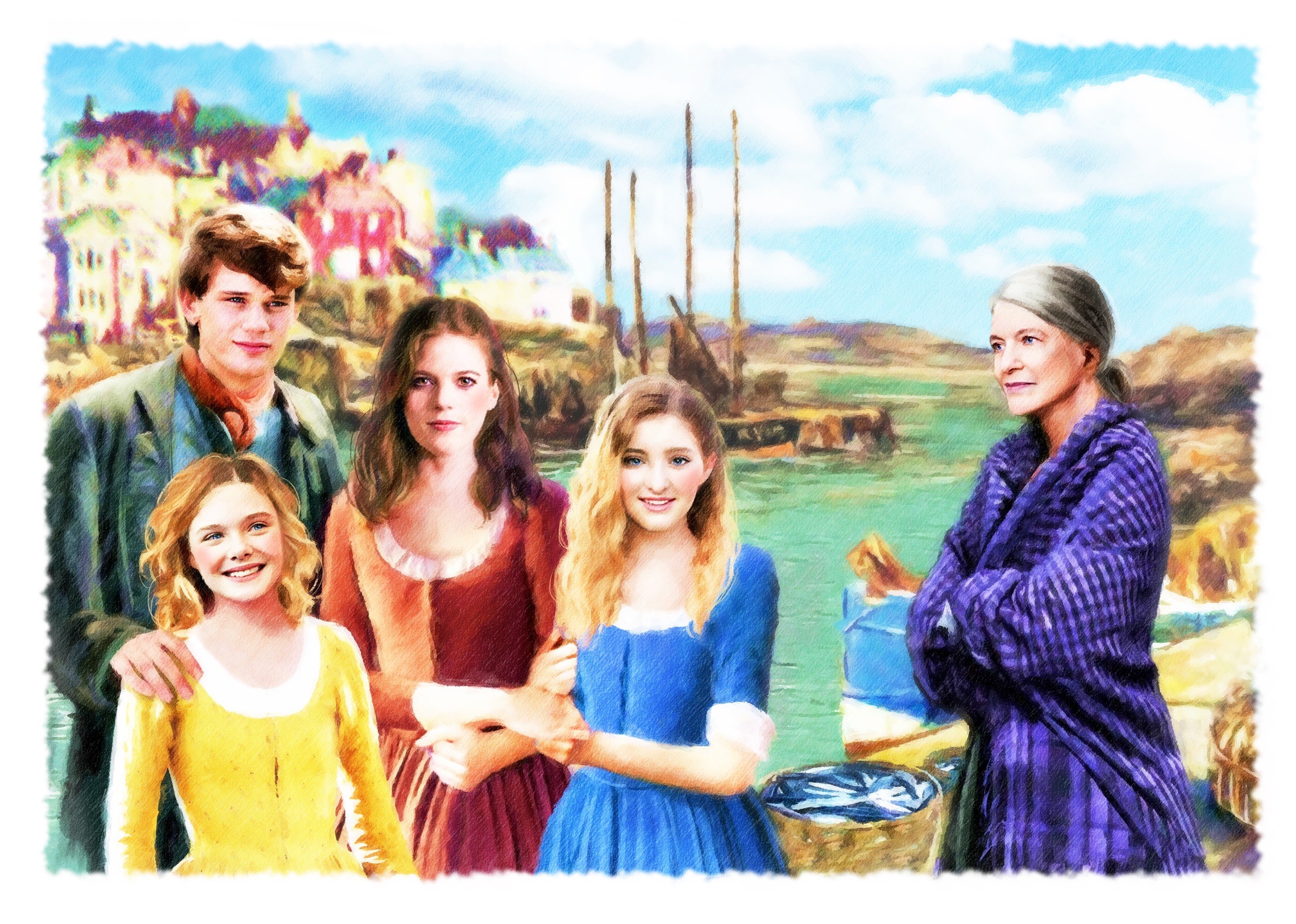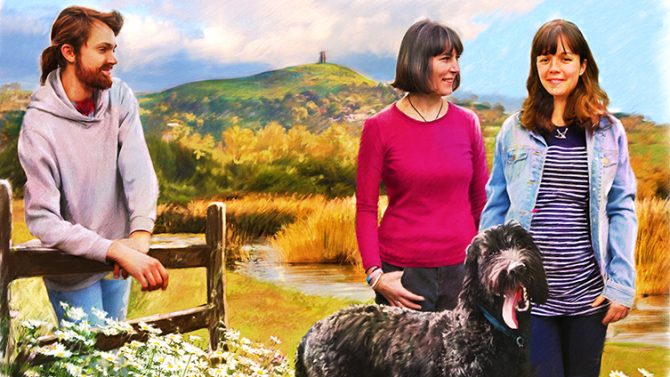Northern Lights – Episode 27

Northern Lights by Betty McInnes
« Previous Post- 1. Northern Lights – Episode 01
- 1. Northern Lights – Episode 27
Maggie snatched an old working shawl off the peg and threw open the outer door. Lilias grabbed her arm.
“Bide a moment, Maggie! Where are ye off to?”
“Away from this house. Away from you!”
Shaking off her grandmother’s hand, she rushed into the street, the wind teasing out escaping tendrils from beneath the linen close cap. When she reached the grocery store a dishevelled reflection in the shop window mirrored Maggie’s agitation.
Peering apprehensively through the glass, she saw Samuel Cameron alone, readying shelves for a day’s work. She opened the door and stepped inside.
Caught off guard, he cried out joyfully.
“Oh, Maggie, it gladdens my heart to see ye!”
“I – I regret I’ll no’ be washing shop windows any more, Mr Cameron,” she stammered, flustered by the love light in his eyes.
Samuel swiftly recovered his composure.
“Well, Maggie, this is not unexpected. I heard the Cargills are to open a lodging-house. I wish you and your family great success wi’ the venture.”
“Thank ye kindly, sir.” Maggie kept her eyes downcast.
Beatrice Cameron chose that moment to appear and Samuel turned his head.
“Maggie won’t be washing our windows any more, Beatrice. She’ll help her grandmother start a lodging-house for the Bell Rock workers. It is a grand opportunity, but we will miss her, won’t we?”
“Indeed we shall, but I’m pleased Mistress Spink has favoured us wi’ an order for the lodgings and will remain a valued customer.”
Miss Cameron smiled but her eyes were cold. Maggie edged towards the door.
“I must go. Good day.” She bobbed a farewell.
Maggie hurried through busy streets and made her way to the edge of town where a well-trodden path began. Climbing upwards, she arrived at the summit of Arbroath’s high red sandstone cliffs. Down below, waves broke in a crashing froth over jagged rocks, though the sea beyond lay calm.
Maggie’s view was misted with tears. Though high on the cliff top, she had never felt so lowly. Why? In the last six years maybe she had lost more than beloved parents. Maybe she had lost her self-esteem.
Walking the streets scavenging for food had made her feel as ugly as the rags she wore.
Maggie lifted her chin. But that wasn’t so! She couldn’t claim to be as fair as Cathy Mary, but her reflection in the looking glass revealed bonnie brown eyes, white teeth and a strong look of her handsome father.
She smiled, uplifted. Samuel Cameron loved her!
She knew bold fisher lads made hopeful eyes at her when passing in the street. If she’d ever thought of suitors, she’d supposed she’d wed a fisherman one day. She had looked no higher.
Yet, why not? She was Margaret Cargill, her father’s daughter. A grand catch for any man.
Head held high, Maggie headed homewards.
* * * *
Twelve-year-old Amy was sorry she had told her grandmother an untruth. True, she would hate working in the lodging-house; she loved working in the sailmaker’s yard and would miss her workmates.
But the real truth was that there was a special commission she must finish, for a very special customer.
Amy was part of a group of seamstresses in sailmaker Francis Webster’s yard. Mr Webster was an innovator who’d perfected the art of adding linseed oil to woven flax to make canvas waterproof. When sails were not sodden they were lighter, easier to handle and sped vessels faster.
By adding linseed oil to canvas, a distinctive yellow colour was achieved that was popular with sailors for capes and breeches, more pleasant to wear than smearing clothing with smelly whale blubber or animal fat.
Amy and the other children worked in an enclosure off the main cutting shed. They sewed small useful objects from offcuts of scrap material from mainsails.
They mostly made canvas buckets with wooden bases and spliced hemp handles, much in demand aboard ship since metal buckets were noisy, dented easily and scratched paintwork and decking.
The girls also made hammocks and kit bags of various sizes, including ditty bags. A ditty bag was a small canvas bag in which sailors stowed precious personal items such as pipe, baccy, love letters and poignant keepsakes.
Amy excelled at making these and was chosen to sew a ditty bag for a young gentleman who’d been accepted as a Naval recruit.
Her first meeting with thirteen-year-old William Walker was not auspicious. She insulted him through concern for his safety.
“Ye’ll no’ be a powder-monkey, will ye?”
“Of course not! I shall be a midshipman, very soon promoted to Naval officer!”
Chastened, Amy resolved he should have the finest ditty bag ever aboard a British man o’ war.
First, she begged offcuts of best sailcloth from the sailmakers. This was closely woven and strong enough to last a lifetime, though notoriously difficult to sew.
Yesterday, all the pieces had been measured and cut to her satisfaction. This morning she planned to sew, and not even her grandmother’s displeasure could stand in her way.














